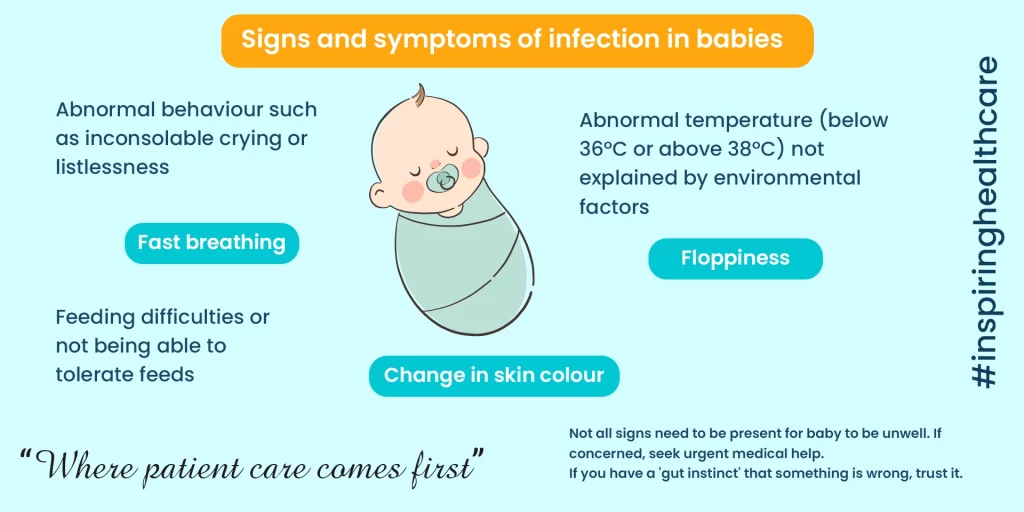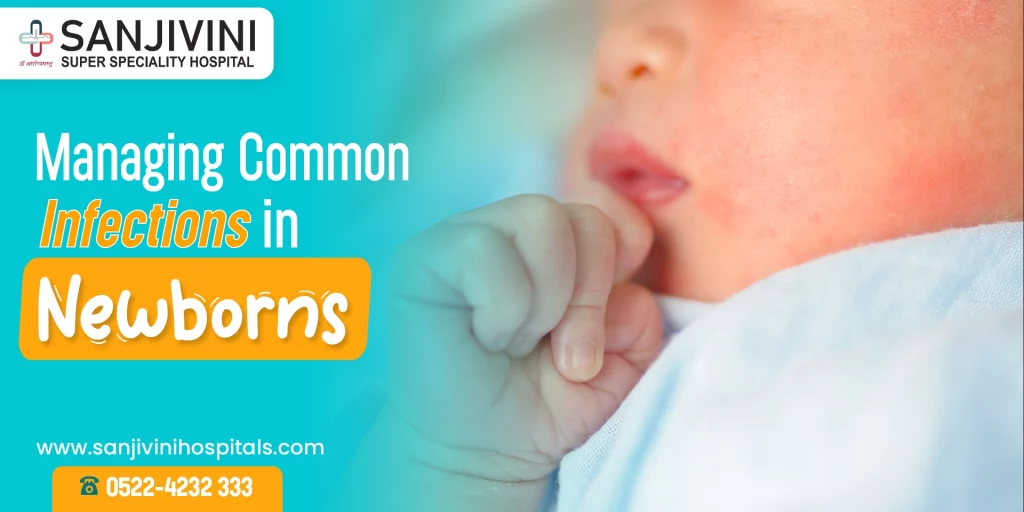Medically Reviewed by: Dr. Sonali Pandey– DCH, MBBS, DNB Paediatrics
Hey there, new parents! Welcome to the wonderful world of parenthood! With your new bundle of joy in your arms, it’s natural to want to keep them safe and healthy. One important thing to know is that sometimes babies can get sick, even when they’re brand new.
Infections in newborns can sound scary, but don’t worry! We’re here to help you understand them and learn how to deal with them. This blog is all about giving you the lowdown on common infections in newborns, from spotting the signs to knowing what to do about them.
As parents, you’ve got this! With a little know-how and a whole lot of love, you’ll be ready to tackle anything that comes your way. Let’s dive in and make sure your little one stays happy and healthy from the start.
Understanding Common Infections in Newborns
Newborns are prone to infections, mainly bacterial ones like neonatal conjunctivitis, pneumonia, sepsis, and meningitis.
The typical bacteria causing these infections are group B streptococci, Escherichia coli, Klebsiella, and chlamydiae. Viruses such as herpes simplex viruses (HSV), human immunodeficiency virus (HIV), hepatitis B, and respiratory syncytial virus (RSV) can also infect newborns. The causes and risk factors for each infection differ, with symptoms like fever, lethargy, rapid breathing, rashes, diarrhea, and swollen belly being common signs to look out for. Early diagnosis, prompt treatment with suitable antibiotics, and follow-up care are crucial to prevent neonatal infections.
Also Read : Neonatal Jaundice: Causes, Symptoms, and Treatment
Overview of common infections:
- Neonatal Conjunctivitis
- Also known as ophthalmia neonatorum.
- Caused by bacteria like Chlamydia trachomatis and Neisseria gonorrhoeae, or viruses like herpes simplex virus (HSV).
- Pneumonia – Most Commonly caused by RSV (Respiratory Syncytial Virus)
- Common respiratory illness in newborns.
- Symptoms: cough, wheezing, difficulty breathing.
- Premature infants and those with heart or lung conditions are at higher risk of severe RSV disease.
- Neonatal Sepsis
- It occurs in babies under 28 days old, reacting severely to infection.
- Common bacteria include E. coli, Listeria, and Group B streptococcus (GBS).
- Other triggers: viruses, fungi, and parasites.
- Symptoms: temperature changes, breathing difficulties, diarrhea, reduced movements, seizures, and jaundice.
- Urgent medical attention is needed for infants showing symptoms.
Symptoms and Signs

Neonatal infection can be acquired :
- In utero transplacentally or through ruptured membranes
- In the birth canal during delivery (intrapartum)
- From external sources after birth (postpartum)
In utero infection
- In utero infections occur during pregnancy before birth and can have various consequences.
- Consequences depend on factors such as the infection type, gestation timing, and the agent involved.
- Possible consequences include spontaneous abortion, intrauterine growth restriction, premature birth, stillbirth, congenital malformations (e.g., rubella), and symptomatic or asymptomatic neonatal infections (e.g., CMV, toxoplasmosis, syphilis).
- Common infectious agents transmitted from mother to fetus through the placenta include rubella, toxoplasma, CMV, syphilis, and the Zika virus.
- HIV and hepatitis B are less commonly transmitted transplacentally.
Intrapartum infection
- Neonatal infections such as herpes simplex viruses, HIV, hepatitis B, group B streptococci, E. coli, Listeria monocytogenes, gonococci, and chlamydia commonly occur during passage through an infected birth canal.
- Delayed delivery after the rupture of membranes can sometimes lead to ascending infection in newborns.
Postpartum infection
- Postpartum infections can be transmitted to newborns through different means.
- Direct contact with an infected mother can lead to transmission of infections like tuberculosis, which may occur even before birth.
- Newborns are at risk of acquiring infections from contact with family members, visitors, healthcare providers, or unhygienic conditions at the place of delivery.
- Various organisms present in hospitals can cause neonatal hospital-acquired infections.
Prevention Strategies
- Prenatal care and screening: Regular prenatal check-ups with a healthcare provider help identify potential risks to the baby’s health. Basic precautions like handwashing and medication can also reduce the risk of infection transmission.
- Intrapartum antibiotic prophylaxis for GBS: If a woman tests positive for Group B Streptococcus (GBS), antibiotics during labor can prevent early-onset neonatal sepsis.
- Vaccination of pregnant women: Immunizing expecting mothers protects both mother and baby from infectious diseases. For example, the flu shot can prevent influenza in both.
- Hand hygiene and infection control in hospitals: Strict handwashing and infection control measures in medical settings are essential for preventing the spread of infections to newborns.
- Breastfeeding promotion: Encouraging breastfeeding, especially in the early stages, provides newborns with vital antibodies and protective factors, boosting their immune systems.
Also Read: Caring for a Child with Asthma: Tips for Parents
Diagnosis and Management
Diagnostic Tests for Common Infections
Diagnosing common infections in newborns often requires both clinical evaluation and specific tests. These tests may include blood cultures, complete blood count (CBC), C-reactive protein (CRP), chest X-rays, lumbar puncture, and tests targeting viral infections such as PCR or antigen detection. These tests help identify bacteria, viruses, or other pathogens, as well as the body’s response to infection.
Treatment Options and Guidelines
Treating common infections in newborns typically involves antibiotics for bacterial infections and supportive care for viral ones. Antibiotic choice depends on the likely pathogens and local resistance patterns. Antiviral medications may be prescribed for specific infections like herpes simplex virus (HSV). It’s crucial to follow evidence-based guidelines for managing neonatal infections, such as those from the Indian Academy of Pediatrics (IAP) and the World Health Organization (WHO).
Importance of Multidisciplinary Care
Effective diagnosis and management of neonatal infections require teamwork among pediatricians, neonatologists, and infectious disease specialists. Neonatologists specialize in newborn care and provide expertise in managing these infections. Pediatric infectious disease specialists offer advice on using antimicrobial agents appropriately and managing specific infectious diseases. Collaboration among these specialists ensures comprehensive and tailored care for newborns with infections.
Complications and Long-Term Effects
Potential Complications of Untreated Infections Neglected infections in newborns can result in severe consequences, such as sepsis, meningitis, pneumonia, and even death. When infections aren’t caught and treated promptly, they can cause lasting harm to the body’s organs and tissues, leading to delays in development, hearing impairment, and vision issues.
Long-Term Effects on Child Development Infections during infancy can impact a child’s development over the long term, causing cognitive and motor delays, as well as hearing and vision problems. Timely detection and treatment of infections can help stave off these enduring effects.
Importance of Follow-Up Care and Monitoring Regular follow-up care and monitoring are crucial for newborns who’ve dealt with infections. These infants may need ongoing medical attention, including screenings for hearing and vision, developmental evaluations, and vaccinations. Routine visits to a pediatrician or neonatologist are vital to catching any lingering effects of the infection and managing them effectively.
Sanjivini Super Specialty Hospital – Your Trusted Partner in Newborn Care!
👶 Managing Common Infections in Newborns? We’re Here to Help!
📅 Book Your Consultation Now and Ensure Your Newborn’s Health!
📞 Call 0522-4232333 or visit Sanjivini Super Specialty Hospital to schedule your consultation today!

